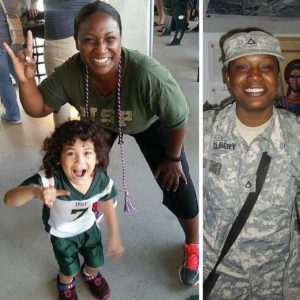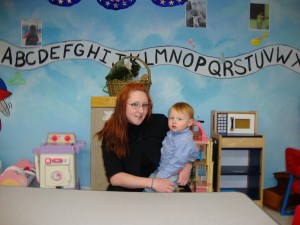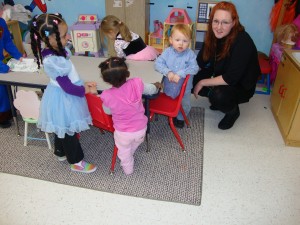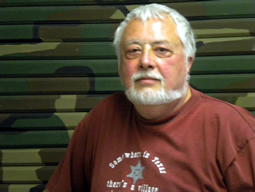Success Stories

Partway along the long drive from Florida to Maine with her four-year-old son on her way to a new job and a new life, Andrea realized she wasn’t “going to make it.” Running out of money, she could no longer afford to stay in hotels along the way. She had nowhere to go and no means of continuing her journey. She was stuck.
The move from Florida to Maine is what Andrea has called “‘The Great Escape’ (from poverty).” An Army veteran who served in Afghanistan and Iraq, Andrea was honorably discharged after four and a half years of service when she became pregnant with her son. Faced with starting a new career and the end of her marriage, Andrea struggled as a single mom in school full-time, but ultimately earned her master’s degree in social work.
When a friend saw an open social worker position in Maine, Andrea jumped at the opportunity to move back and better her life. She packed her belongings, rented a storage unit, and readied herself and her son for the long journey. Having reached out to Veterans Inc. in Maine to inquire about the Supportive Services for Veteran Families (SSVF) program, she knew of the organization’s other New England locations. So when she realized she could go no further, she began making her way to the Veterans Inc. women and children program in Worcester, MA.
After spending a night sleeping in their car, Andrea and her son met with the Veterans Inc. staff the next day, and they immediately got to work assisting her. Andrea soon realized that this place was more than just a shelter, as she describes, “This is where I’m meant to be.” She and her son were given a place to stay, her son was enrolled in the Little Patriots Early Learning Center downstairs, staff secured a hotel for her so she could interview for a temporary job in Maine, and they lined up an apartment and SSVF services.
In the course of just a couple of weeks, Andrea was back on her journey to her new life, having secured housing, services, support, and a temporary job in Maine. In a letter to one Veterans Inc. staff member she writes, “Thank you for being a shining star on one of the gloomiest time of my life. If it were not for you letting me stay when I landed on your doorstep. . . I would have been lost. . . Your kind heart and genuine devotion to veterans not only made my plans come true but your effective[ness] and efficiency made things happen that I didn’t even know I needed or wanted.”
Andrea says that it if not for the ability of the Veterans Inc. staff to move quickly to address her immediate and long-term needs, “things would have been drastically different.” “Everyone was understanding, compassionate, and empathetic,” Andrea recalls, and she is grateful for all of the help she has received. Today, she continues to get settled in her new apartment and is waiting for her new job to start. She is excited and hopeful about her new life and has set a goal for herself for next year: to own her very own home.


Keri-Anne served in the U.S. Army from 2006-2008. After finding out late into her first year of service that her father had been diagnosed with cancer and would not make it through the next year, she decided to leave the service early to care for him. This was a hard decision for Keri-Anne, as she had hoped to make a career out of the military.
After her father passed away, Keri-Anne had nowhere to go and no one to turn too; she felt helpless. But once she found Veterans Inc., things started to turn around.
Now 24 years old, Keri-Anne and her 18-month-old son came to our program in early September 2011 after poor family relations and lack of child care left Keri-Anne homeless. She also suffered from post-traumatic stress disorder and had a service-connected physical disability for which she was receiving no assistance.
As soon as Keri-Anne entered the program, she immediately met with case management to address her goals. As a single mom, her concerns were mainly focused on her son, including enrolling him in daycare, as well as obtaining training so she would become more marketable in the workforce.
Keri-Anne’s case manager worked with her to develop a plan of action, assisted her with VA and other benefits applications, and referred her to several ancillary service provider partners. Action was taken immediately to assist her in obtaining income (temporary assistance through the local Veteran Service Officer for State Chapter 115 benefits), obtaining her son’s birth certificate and her ID and social security card, all of which would assist her in getting her son enrolled in daycare and with her finding employment.
Her son was immediately enrolled in Veterans Inc.’s Little Patriots Early Learning Center, providing her with childcare and parenting support. Prior to his enrollment in Little Patriots, Keri-Anne says that her son wasn’t very verbal or social, but once he enrolled in Little Patriots, his motor and verbal skills increased tremendously. He’s so curious about everything around him and has a pretty good vocabulary for a two year old.
Keri-Anne is now actively engaged in mental health counseling and is receiving benefits from the VA for her service-connected physical disability. She has moved into her own apartment and taken some classes through Veterans Inc.’s employment and training department with the hopes of going back to school in the fall to finish her degree.

“You can’t take a 19-year-old brain and subject it to the constant threat of death or injury by rocket fire and expect it not to be affected,” Roy R. says of his year in Phu Bai and Danang during the Vietnam War and his subsequent 30-year struggle with Post-Traumatic Stress Disorder (PTSD).
Roy wasn’t an infantryman in the U.S. Army. He was a combat engineer, responsible for building roads for the troops through the jungle and demolished infrastructure of the Vietnamese countryside. But, as he points out, “There weren’t any frontlines in Vietnam. If you were there, you were in it. Everyone had the opportunity to get killed. Rockets were regularly coming down on our heads, and we were constantly under fire.”
After serving his country in Vietnam, Roy left the military in 1969. He spent a few years experimenting with different jobs: songwriter, administrative clerk, house painter, and loading dock worker, before enrolling at the New England School of Broadcasting.
So began a nearly 20-year, successful broadcast journalism career. He moved from market to market, at first for radio jobs in places like Putnam, CT and Hyde Park, NY. A friend lured him to Abilene, Texas where he got into television, and then to San Antonio. Along the way, he won awards for commercial production and jingle writing.
Eventually his career took him to XTRA-TV in San Diego, where his PTSD overwhelmed him. “It was Vietnam telling me, ‘It’s time to deal with me now.’” Depressed and unable to function, he left his job and went home to Massachusetts to “re-charge his batteries” on a friend’s suggestion.
But things only got worse in Boston. He became agoraphobic, staying inside with the blinds drawn all the time. He drank too much and avoided people at all costs. Roy lived this way for about eight years before deciding to choose between suicide and getting help. He chose the latter.
In the mid-90s, Roy went to the VA in Worcester, MA. He credits his counselor with saving his life with medication, therapy, and straight talk about “where I wanted to be in five years and how I was going to get there.”
Within a few years, Roy had earned a bachelor’s degree in broadcast journalism, magna cum laude, from UMass Amherst. But child support complications, exacerbated by the years when he couldn’t work, forced him to live in a van on a friend’s property. After deciding he was too old to live like that, Roy came to Veterans Inc. on Grove Street in Worcester, MA, which was a “godsend, giving me breathing room,” he says.
Looking back, Roy thinks soldiers from the Vietnam era were particularly susceptible to PTSD because of feelings of isolation. “In earlier wars,” he says, “a group of men trained as a unit, were sent to fight as a unit, and returned home as a unit. That meant you had an instant support system. In Vietnam, by contrast, it was the “army of one” approach. When I got to Phu Bai, I didn’t know a soul.”
Veterans Inc. gave Roy the support system he had lacked. “Just being in a group of guys going through the same thing, rubbing elbows with them, is like being back in a military unit. I think that’s the most important aspect of this place – the built-in support system.”
Roy is far from alone in waiting to get help for his PTSD. “A lot of guys think they can handle this by themselves, but the mind won’t let you suppress feelings just because you don’t want to deal with them. Eventually the situation surfaces and demands attention.”
He emphasizes that veterans shouldn’t try to fix this by themselves. “You can have friends and family who will listen to you for a while, but they are not qualified to help you overcome this.”
Having become a convert to the need for medication to treat PTSD – “as I understand it, when people are trying to kill you, it alters the interior of your brain,” he explains – he is happy to be using less medication than before. Since coming to Veterans Inc., he has started depression and anxiety counseling. “I’ll always be dealing with this – PTSD, depression, shell-shock – whatever you call it, it’s my life.”
At 62, Roy isn’t expecting to revive his once flourishing journalism career. However, he is having fun helping out a good cause, producing public service announcements for the Worcester Animal Rescue League at Channel 13 community television. He hopes to create programs or videos for another good cause eventually: helping veterans and others recognize the symptoms of PTSD.
When you meet John C., you can’t help but wonder what his energy, sense of humor, and work ethic might have been directed toward had he not lost an eye nearly 30 years ago. Instead, a traumatic accident derailed the 19-year-old’s plans to make a career in the U.S. Navy and set him off on a road of self-destructive drinking and drug abuse as he struggled to make sense of his life.
John loved the Navy, but the accident ended his military career after only one year and a day. Despite 12 hours of surgery and four operations in five months, he lost his eye and was honorably discharged. The loss of the eye hit him hard, but he was told he was fine emotionally and sent on his way. Within weeks, he was drinking heavily and using drugs. Within a few years, he had numerous drunk-driving arrests. “There are a lot of forks in the road of life and I have the tendency to take the wrong one,” he says. “I didn’t want to face the new life I was thrown into, and I didn’t care about the consequences of anything back then.”
But through the bad years, part of John wanted better for himself. In 1987, at age 24, he went through a rehab program and stopped drinking. He hasn’t had a drink since, but drugs were harder to kick. Throughout the 1990s, he abused cocaine regularly. In another burst of inner strength, he woke up one morning seven years ago, after a three-day bender, and decided to stop using drugs for good. He has been drug-free ever since.
John held down good, regular jobs throughout his life at car dealerships and in the sheet metal and concrete industries. But anger, anxiety, depression, and sleeplessness plagued him, even after he got clean. The frequent headaches he suffered from since the accident added to his problems. But Post-Traumatic Stress Disorder wasn’t widely recognized in those days, and John went undiagnosed.
In late 2008, John asked Veterans Inc. to help him get his life back on track. “I was going downhill when I got here. The case managers helped me think straight and guided me in the right direction. They were always there for me. It didn’t matter how big or small the problem was. It was like climbing a set of stairs, one step at a time.”
“Six months after coming here, I started feeling better about myself. I went to AA meetings every night, and talked to a therapist once a week.” John got his driver’s license back and worked in the shelter’s kitchen as well as volunteering for other jobs around the building. With his case manager’s help, he filed for disability benefits but was rejected four times. He wouldn’t give up. The fifth time, he was awarded benefits. Today, he receives disability benefits for his lost eye, the headaches, and the osteoporosis he was diagnosed with later in life.
The osteoporosis in his back is so severe it puts him at risk for a debilitating injury. For some time, the resulting inability to work depressed him, but today he has a broader perspective: “I can’t let it get me down or I’ll be down the rest of my life. I’ve learned not to judge myself for not being able to work.”
John’s upbeat, positive outlook on life is contagious. “Veterans Inc. helped me get my life back. Everything is 180 degrees different than before,” he says. But he hasn’t forgotten the tough times he went though, often due to his own actions. After too many accidents caused by substance abuse, he says “I don’t really know why I’m still here. Maybe it’s to let people know that there are second chances. If you have the willpower, you can re-build your life.”
John moved out of Veterans Inc. housing in March 2010, after a little over a year here. He lives with his girlfriend and their two cats, and they hope to add a dog and move to a home in Maine or New Hampshire in the future. In the meantime, he visits the Grove Street headquarters daily, “to talk to the guys, especially the new ones, who need a little hope.”
